Zucchini not growing is a typical yet frustrating issue. Identifying the problems can be tricky, but don’t worry. This guide will uncover all the possible causes and offer potential solutions.
If your Zucchini vegetables are not growing, common reasons are incorrect watering, poor soil, insufficient sunlight, pests and diseases, and extreme temperatures. To address these issues, follow proper watering techniques, use high-quality soil, inspect for infestations, and shield the plant from extreme temperatures.
Are you facing similar issues with your Zucchini plant? Read this article till the end to resolve the problems hindering Zucchini growth quickly and effectively and care tips to encourage optimal growth.
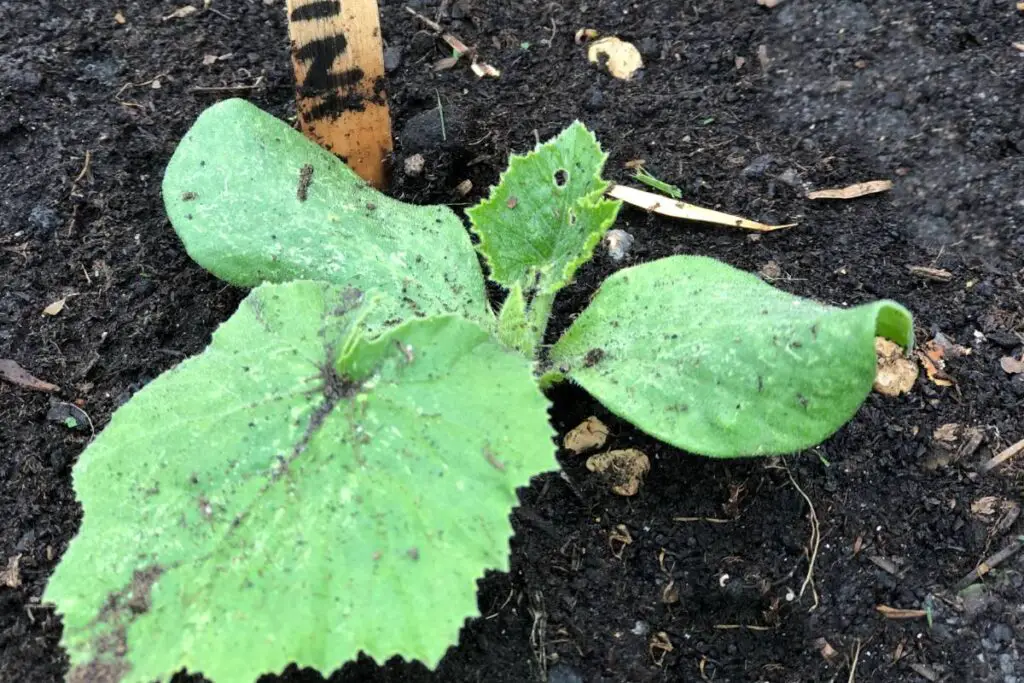
Common Zucchini growth problems
Zucchinis are easy to grow, and they develop rapidly.
They will thrive and produce many fruits throughout the summer with proper care and maintenance.
However, in their growing process, Zucchinis might face a few issues that can hinder the plant’s growth and development.
As a result, the plant will struggle to develop or stop growing at all.
When facing the same problem, I decided to investigate its causes and potential solutions.
Here are some potential reasons why a Zucchini plant may not be growing:
- Watering issues
- Poor soil conditions
- Lack of pollination
- Insufficient sunlight
- Environmental factors like improper sunlight and extreme weather
- Poor seed quality
- Zucchini pest and disease problems
- Planting depth
- Competition with weeds
- Inadequate spacing
- Improper pruning
- Chemical contamination
These are the typical problems, from the most common to the least common.
Let’s learn them in detail to understand why and how these reasons stop the Zucchini plant from growing.
Zucchini is not growing due to overwatering
Zucchini plants enjoy evenly moist soil.
It requires watering when the top few inches of the soil has dried.
If the soil is waterlogged, the roots will suffocate, and they fail to pass the moisture and nutrients to the other plant parts.
For this, the plant may stop growing.
Over time, the roots may begin decaying.
Root rot can be a severe issue.
So, do not let your plant reach this stage.
Proper Zucchini Watering Techniques
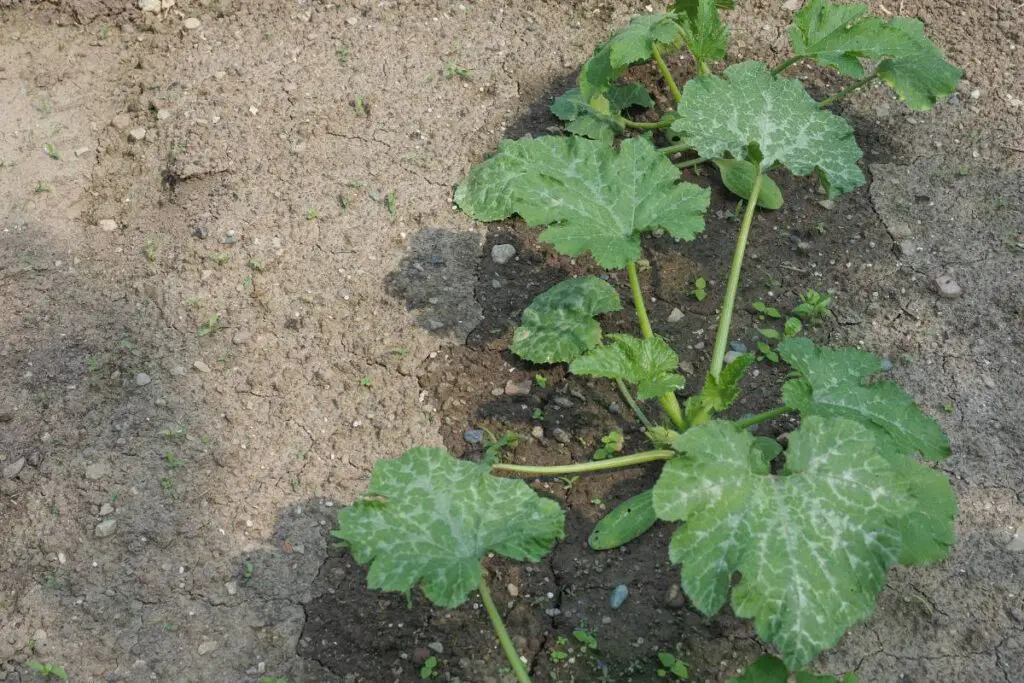
If you find stunted growth, look for additional signs like damp soil or yellowing zucchini leaves to understand the problem better.
If the soil feels damp, wait longer to let it dry.
Also, ensure that Zucchinis receive enough sunlight.
That will aid in fast drying.
Do not follow any strict routine or frequency.
After resolving the overwatering issue, your Zucchini will resume growth.
Soil Issues and Zucchini Growth
Poor soil drainage also results in the same thing as overwatering.
Water doesn’t drain, stays stagnant around the roots, suffocates them, and stops the plant from growing.
The signs will also be the same: yellow leaves, soggy soil, and defoliation.
You can pinpoint the issue when it persists despite correct watering practices.
Soil preparation
Add some organic matter like compost to the soil to improve the drainage.
If the treatment is correct, your Zucchini plant will start growing after some time.
Always add organic matter to the soil before planting the Zucchinis.
It improves both drainage and retention.
Follow our Zucchini Soil article for the correct soil preparation to improve its quality.
Improper pH levels
Another problem to consider here is the pH levels.
Improper pH levels can also affect Zucchini growth.
Zucchinis enjoy 6.5 to 7.0 soil pH.
When the pH levels are too high, it creates a nutrient imbalance, which can further stress the plant and stop its growth.
If your Zucchini plant is not growing, check the pH of the soil.
If the pH is too low, use lime or wood ash.
For high soil pH, add gypsum or sulfur.
If pH was the problem, your Zucchini should resume growth after this treatment.
Zucchini is not growing due to poor pollination
Here, it is not the plant that stops growing but the fruits.
Zucchini flowers need to pollinate for fruit production, and pollination failure means a lack of Zucchini fruit.
There could be multiple causes, like lack of bee activity, use of pesticides, watering at the wrong time, or poor weather.
There are a few practical solutions:
- Consider hand-pollinating the Zucchinis.
- Grow flowering plants to attract more pollinators in your garden.
- Grow Zucchini varieties that can grow fruits without pollination. Don’t expect seeds from these fruits.
- If a specific side of your garden lacks bee activity, analyze your garden and plant your Zucchini in a location with more bee activity. Consider this as a preventive measure.
Pollination and pollinators
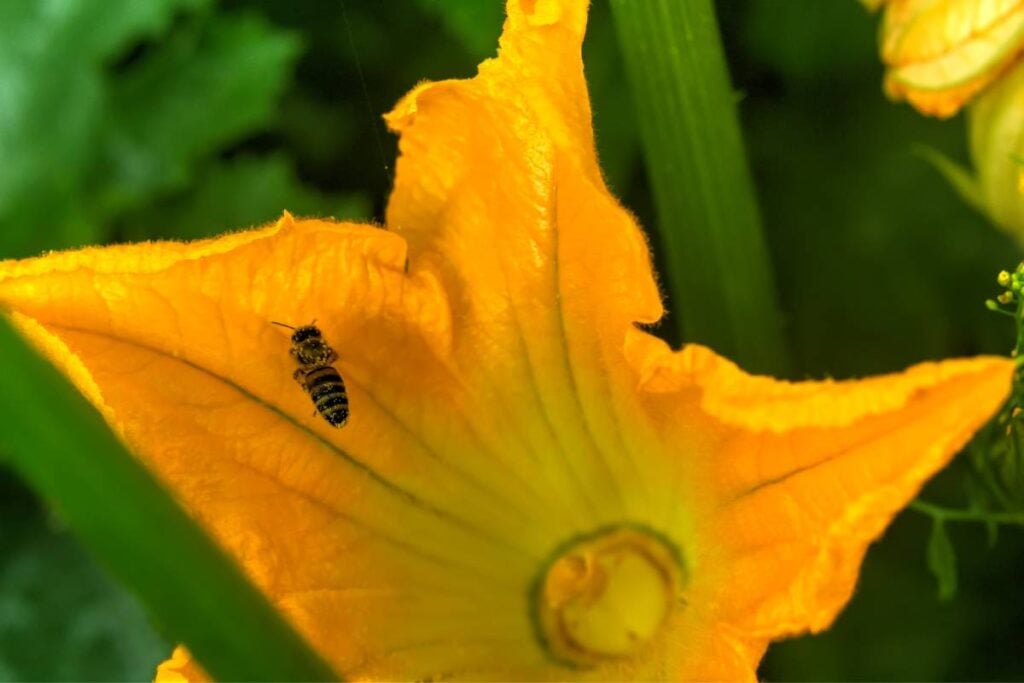
Zucchinis rely on pollination for fruits.
Zucchinis are self-pollinating plants where the pollination occurs through natural methods.
Wind, air, or pollinators, like bees and butterflies (primary agents), will carry the pollen from the male flower to the female flower to pollinate.
After a few days, you will notice new fruits.
The only exception is the parthenocarpic Zucchini varieties.
They do not need to pollinate to produce fruits, but they also do not have any seeds.
These varieties are ideal for cooking, but you won’t have seeds for the following year’s planting.
Zucchini is not growing due to insufficient sunlight
Sunlight is one of Zucchini’s essential requirements for healthy growth and development.
Lack of sunlight can lead to numerous problems and no growth in one of them.
Initially, the Zucchini will have tall and leggy stems.
Over time, it will stop growing.
Tall Zucchini indicates that the plant was trying hard to reach for the sunlight.
Lack of sunlight reduces the chances of photosynthesis.
For this, the plant faces an energy shortage for the multiple metabolic processes and stops growing.
Moreover, sunlight helps in the uptake of nutrients and moisture.
Insufficient sunlight can hinder the plant’s ability to absorb nutrients despite fertile soil and fertilization.
Eventually, the plant will stop growing.
Zucchini sunlight requirements
Zucchini needs 6-8 hours of sunlight daily.
Prevention is the best way out because you won’t want to transplant your Zucchini from one place to another.
It is not only messy, but it also causes transplant shock in the Zucchini plant.
Before planting, find a location that receives 6-8 hours of sunlight, and then plant your Zucchini.
If you have already planted them, you can take the risk of transplanting them.
Just take good care and don’t stress them further.
I had some Zucchinis in my backyard that weren’t getting enough sun.
I realized their stress late, but I did not change their location.
Instead, I used outdoor Grow lights. That worked well for me. You can also give it a try.
Looking for gardening supplies? We have tested 100's of products before recommending them to you guys. Check out our best pick below:
| Image | Gardening Supplies | Best Price? |
|---|---|---|
 Top
Top Top
Top | Raised Garden Bed Kit | Check On Amazon |
 | XLUX Soil Moisture Meter, Plant Water Monitor, Soil Hygrometer Sensor for Gardening, Farming, Indoor and Outdoor Plants, No Batteries Required | No Results |
 Top
Top Top
Top | 82 Pcs Garden Tools Set and Extra Succulent Tools Set | Check On Amazon |
 | Joeys Garden Expandable Garden Hose with 8 Function Hose Nozzle, Lightweight Anti-Kink Flexible Garden Hoses, Extra Strength Fabric with Double Latex Core, (50 FT, Black) | No Results |
 Top
Top Top
Top | Dual Chamber Compost Tumbler | Check On Amazon |
 Top
Top Top
Top | Sunnyglade Plant Stakes | Check On Amazon |
 Top
Top Top
Top | Organic Cold Pressed Neem Seed Oil | Check On Amazon |
 Top
Top Top
Top | Mighty Mint Gallon :-Insect and Pest Control Peppermint Oil | Check On Amazon |
 Top
Top Top
Top | Scotts DiseaseEx Lawn Fungicide | Check On Amazon |
 Top
Top Top
Top | Jacks Classic 20-20-20 All Purpose Fertilizer | Check On Amazon |
 Top
Top Top
Top | 30,000 Seeds Pollinator Attracting Wildflower Mixture | Check On Amazon |
 Top
Top Top
Top | Survival Vegetable Seeds Garden Kit-Over 16,000 Seeds | Check On Amazon |
Zucchini is not growing due to poor seed quality
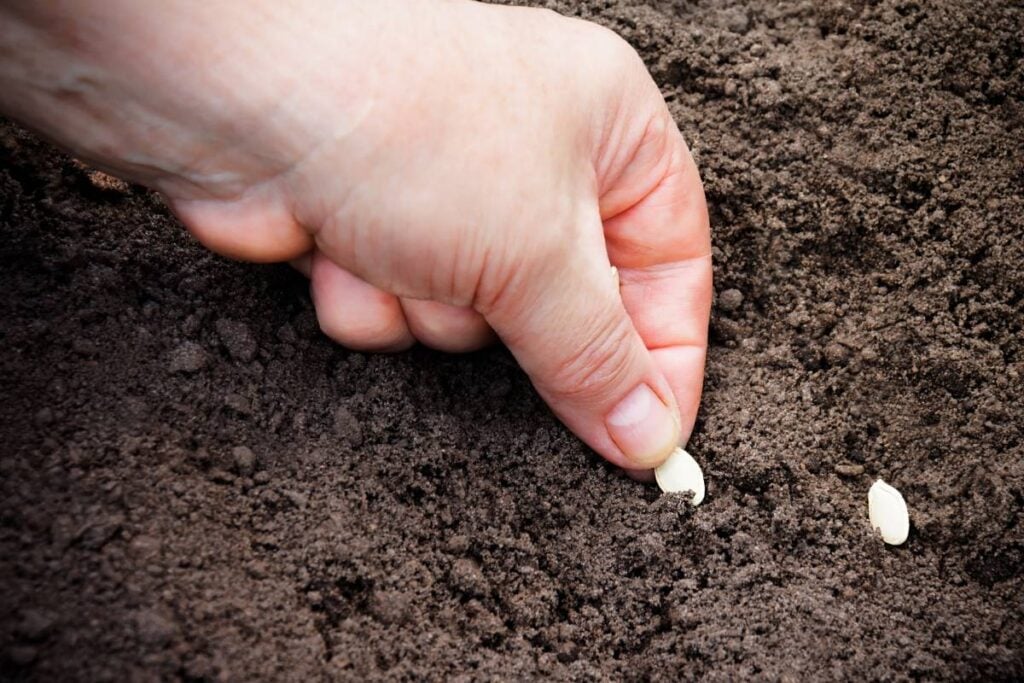
Low seed quality can impede Zucchini growth.
The seeds can somehow germinate. But you will face the growth issue after some time.
So, if you do everything reasonable and still face this issue, the seed quality is poor.
There is no solution for this. You must plant new seeds.
To prevent this, buy viable seeds from reputed companies.
Zucchini Pest problems affecting the growth
Pest infestations can bring numerous problems to the Zucchini plant.
Common pests or insects are aphids, whiteflies, cucumber beetles, squash bugs, and vine borers.
Some feed the plant sap, some make tunnels inside the Zucchini stalk, and others eat the leaves.
When a plant is badly infected, it becomes fragile and has no energy to grow further.
Ultimately, the plant will stop growing after one point.
If left unchecked, the Zucchini will die.
Eliminating pests
You must eliminate these unwanted guests to treat the Zucchini plant and encourage it to grow again. To get rid of them:
- Shower your plant well to dislodge the bugs from their place. Focus on the underside of the leaves.
- Spray some insecticidal soaps and neem oil on the infected parts.
- Release predators like lacewings and ladybugs. They will feed on the bugs.
- If you have vine borers, find the eggs at the plant base and remove them. Spray some pesticides to prevent them from reaching your Zucchini.
- Cut off the infected leaves and dispose of them in the dustbin.
- Grow some companion plants with a strong smell to deter the pests, for example, onion, garlic, lavender, or marigolds.
Zucchini Plant Diseases affecting the growth
Diseases can give rise to many issues, and Zucchini not growing is one of them.
Common diseases are Bacterial wilt, Alternaria disease, Root rot, Blossom end rot, Zucchini yellow mosaic virus, and Powdery mildew.
Whenever a Zucchini is diseased, it becomes so weak that it doesn’t have enough energy to grow well.
If neglected, the plant will stop growing at a point.
To fix this, identify the disease through the signs displayed by the leaves, for example, sudden wilt, weird spots on the leaf surfaces, and scattered white substances (powdery mildew).
Once identified, isolate the plant to prevent spreading, remove the infected leaves, and spray some fungicide to see if the disease can be suppressed.
Sometimes, revival from a disease is not possible.
In that case, you might have to dispose of the plant.
On the contrary, powdery mildew is less dangerous than other diseases.
You can treat the disease and encourage further growth.
Isolate the plant, remove the badly infected leaves, spray some neem oil on the partially infected leaves, and wherever you find powder-like substances. You can also use some fungicides.
Continue caring for the plant; one day, you will see the plant recovering and growing like before.
Zucchini not growing due to Nutrition problems
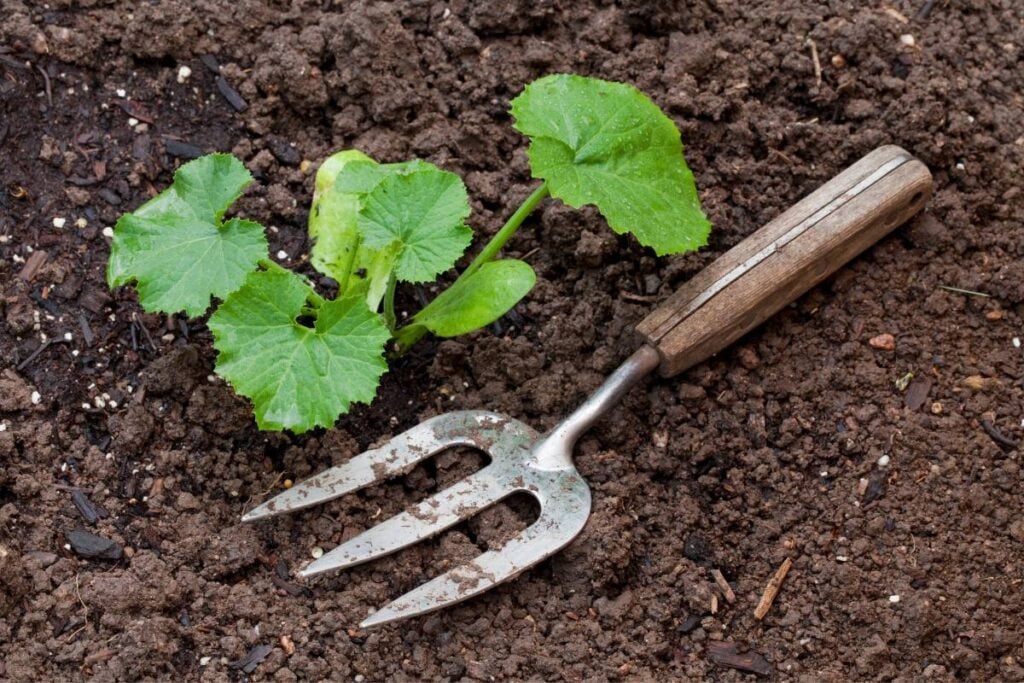
Zucchini plants need nutrients to thrive.
The plant may be able to survive without nutrients momentarily, but it won’t last long.
After one point, Zucchini will slowly stop progressing.
There are other signs of nutrient deficiency, for example, yellowing, small leaves, and short and fatty fruits.
Zucchini Plant Nutrition and Fertilization
To promote Zucchini growth, incorporate organic matter into the soil.
Next, start fertilizing after a few weeks.
Immediate fertilizing can lead to over-fertilization.
So, let the organic matter provide enough nutrients for a few weeks.
After that, the nutrients will deplete, and that’s when you should fertilize.
Use a balanced liquid fertilizer with NPK 10-10-10.
You should also follow this when you are planting new Zucchinis.
Amend the soil with organic matter before planting, and start feeding once the plant reaches a few inches long.
Zucchini is not growing due to planting depth
Here, the seedlings fail to sprout and thrive.
When planted too deep, the seedlings will take forever to reach the soil surface. You will feel like they are not growing.
The seeds need warmth for germination.
When you plant the seeds too deep, they do not receive the warmth of the soil, for which they struggle to grow.
You must plant the Zucchinis at the correct depth.
Usually, you should plant them 1 inch deep.
You can sometimes aim for 1.5 inches, but not more than that.
If you have already planted incorrectly, dig them up and replant them with the proper depth.
Maintain your Zucchini well, and you will soon see new growth.
Zucchini is not growing due to extreme temperatures
The ideal temperature for Zucchini ranges between 70-90°F.
Extreme temperatures can stop the plant from growing.
Temperatures, both high and low, can hinder Zucchini growth.
Zucchinis can’t tolerate cold.
Temperatures below 50°F expose the Zucchinis to frostbite.
The plant won’t grow due to stress.
The same happens when the temperature exceeds 95°F.
It leads to heat stress, and the soil dries out very quickly.
For this, the plant stops growing.
To save your Zucchini from such issues, protect them from extreme temperatures.
If the temperature is high, install shading cloth during the hottest time of the day, increase watering, and add a layer of mulch to prevent moisture evaporation.
If the temperature is low, use frost covers and add a layer of mulch to keep the soil warm.
You can use outdoor Grow lights to prevent warmth.
This is extremely helpful for plants in the colder zones.
Zucchini is not growing due to competition with weeds
When your Zucchinis are not growing, consider checking the surroundings once.
It might be the case that you have plenty of weeds around.
Weeds can contribute to stunted Zucchini growth.
Weeds and Zucchini fight for nutrients, moisture, and other resources.
The Zucchini struggles a lot while competing for resources and eventually stops growing.
You need to clear out the weeds regularly to avoid this competition.
This will encourage good growth.
Additionally, a clean and tidy garden also prevents Zucchini pests and diseases.
Zucchini is not growing due to inadequate spacing
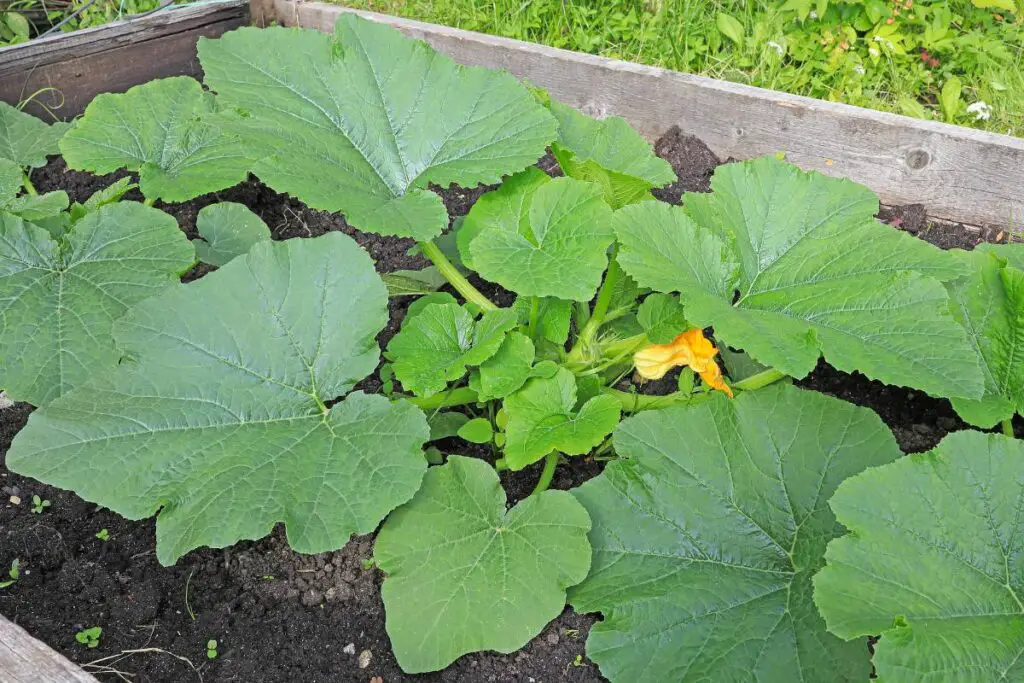
Zucchinis should be planted 2-3 feet away from each other.
The leaves of this plant are huge and heavy and need enough space to grow and spread.
Additionally, the roots will need space to grow and spread flexibly.
When planted close to each other, the Zucchinis will struggle for space.
The roots will eventually stop growing due to the lack of space.
Also, the Zucchini may lack airflow for the leaves, resulting in several diseases, powdery mildew being the most common.
If you have already planted them close, there is no other option than to dig them up and transplant them elsewhere.
It can cause transplant shock in Zucchini, but proper care and maintenance can help the plant recover.
So, prevention is the best method here. Keep 2-3 feet of distance between each Zucchini plant.
Zucchini is not growing due to improper pruning
Zucchinis need to be pruned whenever they are overcrowded.
Pruning Zucchini plants promotes better growth.
When pruning, you should be careful about it.
Too much pruning can weaken the Zucchini and stop it from growing.
Leaves can store energy in the form of carbohydrates the plant uses for growth and fruit production.
Pruning too many leaves prevents this storage, leading to no growth or fruits.
Also, the leaves can regulate water loss.
They can release excess moisture through transpiration.
Removing too many leaves affects this process, causing the plant to suffer from water stress and no growth.
Zucchini pruning techniques
Prune the dead, dried, and damaged leaves and flowers.
For air circulation, remove only a few outer leaves and lower leaves.
You can also remove a few shoots.
Zucchini is not growing due to chemical contamination
Chemical contamination is a rare reason, but it shouldn’t be overlooked.
If you are doing everything correctly but still do not see any growth in your Zucchini, recall when you have watered the plant or used pesticides.
Pesticides containing strong chemicals can affect the plant’s growth by lingering in the soil.
Also, metal contamination can disturb the plant’s metabolism and hinder its growth.
Another reason behind contamination could be that you have some industrial factories near your house.
The chemicals might be released into the soil, making it toxic for the Zucchini and reducing its growth.
Tap water can also affect Zucchini growth.
It contains harsh chemicals that can hinder Zucchini growth over time.
Send your garden soil for a test.
If it is polluted, it is better to grow the Zucchinis in pots or raised beds using ideal soil mixes.
If water is the issue, use rainwater or filtered water.
If tap water is your only option, filter this water or let it stay overnight so that the harsh chemicals can evaporate.
Consult the local environmental and agricultural experts to assess the situation and ask for suggestions and alternatives.
Zucchini plant growth basics and growing tips
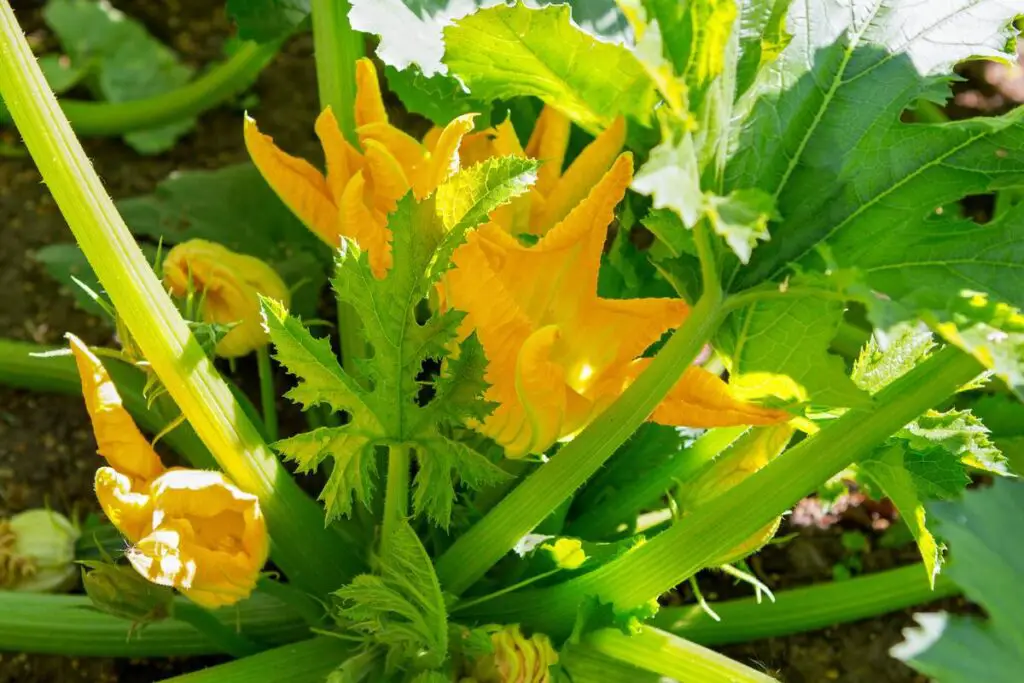
By now, you have learned enough reasons responsible for Zucchini not growing.
Let’s learn about some Zucchini growth basics and tips to encourage growth:
- The planting and growing season is spring when the soil temperature rises above 60-65°F.
- Proper spacing is necessary. Maintain 2-3 feet distance between each plant. Plant them around 1 inch deep.
- For soil preparation, add organic matter to the soil to improve soil quality. You can also add some chicken pellets, but it’s optional. Organic matter would suffice.
- Consider soil testing once you have prepared the soil. It would let you know whether the soil can be used for growing Zucchinis.
- Soil pH for Zucchini should be around 6.5 to 7.
- Soil alone cannot provide enough nutrition, as daily watering depletes nutrients. Fertilization is essential. Feed your plant with a liquid fertilizer once it reaches a few inches tall and grows vigorously.
- Ensure your fertilizer contains essential macro and micronutrients, such as nitrogen, phosphorus, potassium, calcium, magnesium, iron, etc.
- Always maintain evenly moist soil. Water the Zucchinis whenever the top few inches have dried. Do not follow any strict frequency or routine.
- Make sure to plant the Zucchinis in a location receiving 6-8 hours of sunlight.
- Prune your Zucchini whenever they get overcrowded. Aim for the dead and damaged leaves, dried flowers, and a few outer and lower leaves. Don’t over-prune.
- Use rainwater or filtered water for watering.
- If Zucchini is infected, avoid chemical products. Choose natural pest and disease control techniques.
Advanced Zucchini gardening techniques for excellent growth
You can try a few advanced gardening techniques to boost Zucchini growth, like vertical gardening and companion planting.
Vertical gardening is very common.
Many gardeners, both beginners and experienced, use this method.
In companion planting, the plants planted with Zucchinis can help each other grow and deter pests.
Let’s discuss a bit in detail:
Vertical Zucchini gardening
Zucchinis are not climbers, so they typically don’t require support.
Most of the time, they will spread over the ground.
But Zucchinis will appreciate vertical gardening and support. Here are some benefits of vertical gardening:
- The fruits of Zucchinis are heavy. The support can help the plant carry these fruits easily without bending or breakage.
- Since the plant will be above the ground, it will stay safe from several pests and diseases.
- With vertical gardening, the Zucchini plants can receive more sunlight.
- Pruning becomes easier, and the plants can also receive good air circulation.
- Harvesting also becomes more manageable. You will receive clean fruits to harvest.
With these benefits, your Zucchini plant will rarely have any growth issues.
Instead, you will witness vigorous growth with uncountable fruits.
Zucchini companion planting
Companion planting can also encourage growth in the Zucchini plants. Here’s how:
- Plants like tomatoes have giant leaves that can suppress weed growth and moisten the soil, which is excellent for Zucchinis.
- Legumes like beans and peas can add nitrogen to the soil. It can boost the Zucchini’s growth to a great level.
- Tall plants like corn and sunflowers can act as Zucchini’s support system to some extent.
- Herbs like dill, lavender, mint, and lemon balm can deter pests and keep your Zucchini healthy. The pungent smell of garlic and onion can also keep pests at bay.
- Garlic and onions are considered natural disinfectants. They can also prevent fungal diseases.
- Flowering plants like marigolds, sunflowers, nasturtiums, and lavenders can attract pollinators in the garden, which helps grow fruits.
- Borage leaves are nutrient-rich and can stimulate Zucchini growth.
- With these companions, your Zucchinis can thrive and produce better fruits in reasonable quantities.
Final thoughts
As you can see, there are numerous causes responsible for Zucchini not growing. I have shared all the potential causes, from the most common to the least common: overwatering, soil and nutrition problems, temperature extremes, poor seed quality, weed competition, improper pruning, pests and diseases, and contamination.
Since all these reasons can stop your Zucchini from growing, you must find out the real cause and treat it correctly to encourage the plant to grow again. Two issues are easy to tackle. Lack of pollination stops the plant from growing fruit, and planting depth problems stop the seedlings from growing and reaching the soil surface.
Attracting pollinators and planting the seeds 1 inch deep can resolve the problems. A grasp of the fundamental principles of Zucchini growth and following these tips can ensure the long-term health of your plant. Consider advanced gardening tips, like companion planting and vertical gardening, for the best growth performance.
How do I know if my Zucchini is recovering?
Once you detect the issue and take steps to treat the plant, you must closely observe the Zucchini’s growth regularly. Your diagnosis and treatment are correct if you find new growth, like new leaves or flowers.
What support can I use for Zucchinis in vertical gardening?
There are multiple options available, like stakes, fences, or trellis. Choose any of your choices, and use it to see your Zucchini thriving and producing lovely fruits.
Reference: Zucchini Wikipedia
